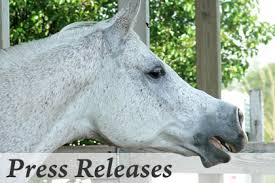Straight Talk About Equine Vaccination
Why it’s important to vaccinate your horse(s)
There’s some truth to the old adage “What you can’t see can hurt you.” When it comes to equine health, it’s sometimes easier to dismiss the need for preventive care as unnecessary, focusing instead on treatment of infectious diseases after the fact.
The reality is, vaccination is one of the most efficient, effective methods of protecting against infectious disease, especially considering that disease can lead to poor performance, long-term health issues and even death.¹
What are Vaccines, Really, and How Do They Work?
We all know what vaccines are, in the sense that most of us likely have experience with them in human health. But how many people have really thought about them in great detail?
The Institute of Medicine defines a vaccine as “a biological preparation that improves immunity to a particular disease.”² Vaccines work by exposing the horse’s immune system to a specific pathogen (generally a dead or weakened form of the disease-causing agent), triggering the animal’s immune system to fight it. That exposure stimulates the immune system within the animal so that it is better able to fight the pathogen in the future, if and when a real exposure to a pathogen occurs. In other words, the vaccine stimulates the immune system in a manner like the typical infection process without actually causing the disease.
Will Your Horse Get Sick Post-Vaccination?
Because vaccines stimulate an immune response, it’s not uncommon for some horses to experience mild, temporary side effects shortly after vaccination. These side effects may include low-grade fever, decreased appetite, fatigue or decreased energy, and tenderness at the injection site. Mild soreness can also temporarily affect a horse’s movement because injections are often given in the muscles of the neck.
If side effects are noted, horse owners should consult with their veterinarian. Additionally, call your veterinarian immediately if your horse experiences hives, difficulty breathing or colic shortly after vaccination, because it could indicate a more serious reaction.
What Could Happen If You Don’t Vaccinate Your Horse?
The vaccination needs and program for horses should be determined on an individual basis with the input of the veterinarian. But speaking in general terms, when a horse isn’t vaccinated, that horse is far more susceptible to infectious diseases that can sicken the animal.
When that sickness is mild, the horse generally will recover with medical treatment, but at a cost. There are also times, despite treatment, that a disease may lead to poor performance, short or long term, as well as potentially cause irreversible damage. Certain infectious diseases can be fatal, often painfully so.
Overall, it is generally much less expensive and in the best interest of the horse to develop a customized vaccination program. Vaccination provides a cost-effective assurance policy of sorts and creates an opportunity for owners and veterinarians to jointly work toward common equine health goals.
What Should You Do if a Disease Outbreak Occurs?
Animal biosecurity refers to the actions taken to prevent disease from being introduced through animals into a specific geographical area, region or location.
As owners work with veterinarians to develop vaccination plans, they should also address management practices and biosecurity measures for their animals relevant to the stressors and possible opportunities for disease exposure.
The Equine Disease Communication Center (EDCC) provides recommended biosecurity protocols for breeding operations, events, facilities, racetracks, and during travel, including disinfection, isolation, and quarantine at www.equinediseasecc.org/biosecurity.
At the end of the day, vaccination is a key component of any equine health plan and an important part of maximizing the overall well-being and productivity of horses.
¹ Paillot R, Marcillaud P, et al. (2017). Equine Vaccines: How, When and Why? Report of the Vaccinology Session, French Equine Veterinarians Association, 2016, Reims. Vaccines. 46(5): 1-11. © 2019 Boehringer Ingelheim Animal Health USA Inc., Duluth, GA. All rights reserved. US-EQU-0170-2019-B
² Institute of Medicine. 2011. What You Need to Know About Infectious Disease. Washington, DC: The National Academies Press. https://doi.org/10.17226/13006.
Written by:
Press Release
Related Articles
Stay on top of the most recent Horse Health news with









